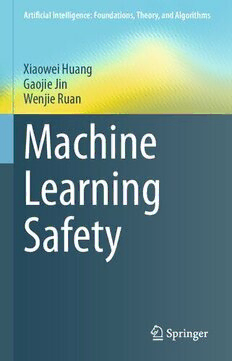Download Machine Learning Safety PDF Free - Full Version
Download Machine Learning Safety by Xiaowei Huang, Gaojie Jin, Wenjie Ruan in PDF format completely FREE. No registration required, no payment needed. Get instant access to this valuable resource on PDFdrive.to!
About Machine Learning Safety
Machine Learning algorithms allow computers to learn without being explicitly programmed. Their application is now spreading to highly sophisticated tasks across multiple domains, such as medical diagnostics or fully autonomous vehicles. While this development holds great potential, it also raises new safety concerns, as Machine Learning has many specificities that make its behaviour prediction and assessment very different from that for explicitly programmed software systems. This book addresses the main safety concerns with regard to Machine Learning, including its susceptibility to environmental noise and adversarial attacks. Such vulnerabilities have become a major roadblock to the deployment of Machine Learning in safety-critical applications. The book presents up-to-date techniques for adversarial attacks, which are used to assess the vulnerabilities of Machine Learning models; formal verification, which is used to determine if a trained Machine Learning model is free of vulnerabilities; and adversarial training, which is used to enhance the training process and reduce vulnerabilities.This book addresses the safety and security perspective of Machine Learning, focusing on its vulnerability to environmental noise and various safety and security attacks. Machine learning has achieved human-level intelligence in long-standing tasks such as image classification, game playing, and natural language processing (NLP). However, like other complex software systems, it is not without any shortcomings, and a number of hidden issues have been identified in the past years. The vulnerability of machine learning has become a major roadblock to the deployment of Machine Learning in safety-critical applications.We will first cover falsification techniques to identify the safety vulnerabilities on various Machine Learning models, and then devolve them into different solutions to evaluate, verify, and reduce the vulnerabilities. The falsification is mainly done through various attacks such as robustness attacks, data poisoning attacks, etc. Compared with the popularity of attacks, solutions are less mature, and we consider solutions that have been broadly discussed and recognised (such as formal verification, adversarial training, and privacy enhancement), together with several new directions (such as testing, safety assurance, and reliability assessment).Specifically, this book includes four technical parts. Part I introduces basic concepts of Machine Learning, as well as the definitions of its safety and security issues. This is followed by the introduction of techniques to identify the safety and security issues in Machine Learning models (including both transitional Machine Learning models and Deep Learning models) in Part II. Then, we present in Part III two categories of safety solutions that can verify (i.e. determine with provable guarantees) the robustness of Deep Learning and that can enhance the robustness, generalisation, and privacy of Deep Learning. In Part IV, we discuss several extended safety solutions that consider either other Machine Learning models or other safety assurance techniques. We also include technical appendices.The book aims to improve the awareness of the readers, who are future developers of Machine Learning models, on the potential safety and security issues of Machine Learning models. More importantly, it includes up-to-date content regarding the safety solutions for dealing with safety and security issues. While these solution techniques are not sufficiently mature by now, we are expecting that they can be further developed, or can inspire new ideas and solutions, towards the ultimate goal of making Machine Learning safe. We hope this book can pave the way for the readers to become researchers and leaders in this new area of Machine Learning safety, and the readers will not only learn technical knowledge but also gain hands-on practical skills. Some source codes and teaching materials are made available at GitHub.
Detailed Information
| Author: | Xiaowei Huang, Gaojie Jin, Wenjie Ruan |
|---|---|
| Publication Year: | 2023 |
| ISBN: | 9789811968143 |
| Pages: | 319 |
| Language: | English |
| File Size: | 8.484 |
| Format: | |
| Price: | FREE |
Safe & Secure Download - No registration required
Why Choose PDFdrive for Your Free Machine Learning Safety Download?
- 100% Free: No hidden fees or subscriptions required for one book every day.
- No Registration: Immediate access is available without creating accounts for one book every day.
- Safe and Secure: Clean downloads without malware or viruses
- Multiple Formats: PDF, MOBI, Mpub,... optimized for all devices
- Educational Resource: Supporting knowledge sharing and learning
Frequently Asked Questions
Is it really free to download Machine Learning Safety PDF?
Yes, on https://PDFdrive.to you can download Machine Learning Safety by Xiaowei Huang, Gaojie Jin, Wenjie Ruan completely free. We don't require any payment, subscription, or registration to access this PDF file. For 3 books every day.
How can I read Machine Learning Safety on my mobile device?
After downloading Machine Learning Safety PDF, you can open it with any PDF reader app on your phone or tablet. We recommend using Adobe Acrobat Reader, Apple Books, or Google Play Books for the best reading experience.
Is this the full version of Machine Learning Safety?
Yes, this is the complete PDF version of Machine Learning Safety by Xiaowei Huang, Gaojie Jin, Wenjie Ruan. You will be able to read the entire content as in the printed version without missing any pages.
Is it legal to download Machine Learning Safety PDF for free?
https://PDFdrive.to provides links to free educational resources available online. We do not store any files on our servers. Please be aware of copyright laws in your country before downloading.
The materials shared are intended for research, educational, and personal use in accordance with fair use principles.

